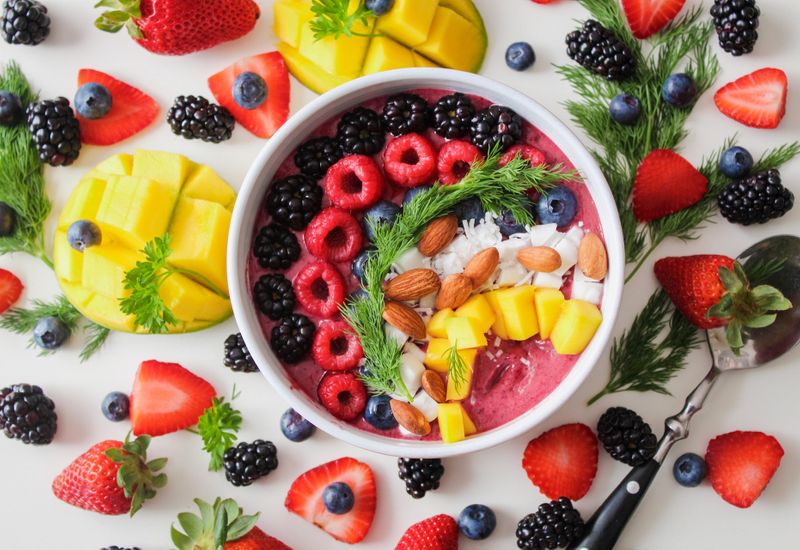We reached out to Ella, who has a master’s in Food Policy, to find out more about the foods you should eat (and avoid) when studying. Here’s what she had to say…
Brain food. Is it a thing? Can it actually help with studying? While stuffing your face full of omega-rich, oily fish just before a study session or exam might not do much good in the short term, a healthy, balanced diet can improve concentration, focus and mental performance.
On the flip side, eating lots of highly processed junk foods can also negatively affect your ability to concentrate and focus for long periods of time.
Here’s a quick rundown of what to eat and what not to eat when you're studying.
DO eat lots of fresh fruit and veg
Okay, so it’s an obvious one. But research shows that loads of fruit and vegetables – especially leafy greens like kale , spinach and broccoli – are rich in brain-boosting nutrients like vitamin K, lutein, folate, and beta carotene.
Studies have also found that eating fruits and vegetables may improve mental well-being almost immediately – which is really important to think about when you’re under pressure with exams or coursework.
DO eat “brain foods” like oily fish
Over the years, there have been lots of claims about “brain” or superfoods – some of them backed up by science, some of them not.
Oily fish like mackerel, salmon and sardines are rich sources of omega-3 fatty acids, which your brain uses to build brain and nerve cells – and have been shown to boost learning, memory and general cognitive function.
But like I said in the intro, these kinds of foods will have the biggest impact if they’re built into a long-term, balanced diet.
DON’T drink sugary drinks
These include fizzy drinks, sports drinks, energy drinks and even fruit juice! A can of regular coke contains around 9 teaspoons of sugar, and even a small bottle of orange juice contains around 6.
While it can be tempting to give yourself a sugary boost when you’re working late into the night, high sugar can lead to a lack of focus. You’ll get an initial boost of energy, but on average, glucose levels drop after 20 minutes and will leave you feeling unfocused and easily distracted. And don’t be tempted to go for low or zero sugar options either – they usually contain the sweetener aspartame which has been linked to a number of health problems.
High sugar intake can also lead to a whole range of health problems down the line – including heart disease, diabetes and brain disease like Alzeihmers – so best to keep an eye on it.
Do drink tea, coffee and other natural caffeinated drinks
While there’s been some controversy over caffeine in the past, research now shows that natural sources of caffeine like tea, coffee and green tea can have positive effects on your brain and mental health. These include…
- Increased alertness
- Improved mood
- Sharpened concentration
Drinking coffee over the long-term is also linked to a reduced risk of neurological diseases, such as Parkinson’s and Alzheimer’s. Like anything, there are negative side effects to over-consumption of caffeine – but as long as you're keeping it to around 6 cups a day or less, you should be fine.
Don’t eat lots of ultra-processed food
Highly processed foods tend to be high in refined sugars, added fats and salt, as well as refined carbs and grains. – and are usually high in calories but low in nutrients. All these factors mean that ultra-processed food can cause sugar spikes and crashes, and addictive eating tendencies, resulting in a lack of focus and concentration. They have also been shown to increase the risk of feeling depressed and anxious, and may even impact long-term brain and cognitive health.
They include all the obvious foods such as junk takeaway food, biscuits, instant noodles and ready-made meals – but also include most supermarket bought bread and cereals. The easiest way to identify an ultra-processed food is to take a quick look at the ingredients list. If it contains a long list of ingredients, many of which you don’t recognise and you wouldn’t find in a domestic kitchen, it’s probably ultra-processed.
While it’s almost impossible to completely avoid these kinds of foods, trying to reduce the amount of ultra-processed food could have a positive impact on your ability to study – and your wider health.
Prospective student? We want to hear from you! Join the Student Hut Forum and earn £s by taking surveys.













